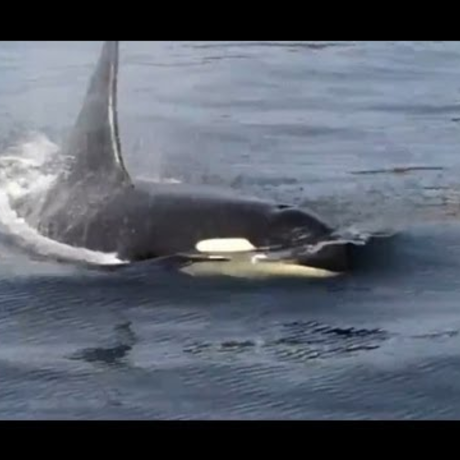Science News
Saving the Panda of the Sea

Sean Bogle breathes vaquitas (Phocoena sinus). These small porpoises—the smallest cetacean among their dolphin and whale cousins—are in trouble. Currently, scientists estimate that there are only 60 individuals left in the wild. But unfortunately for the shy vaquitas, who reside in the northern part of the Gulf of California, people aren’t aware of their plight. Bogle hopes to change that. “Most people do not know what a vaquita is, let alone the issues facing their survival.” So he is working tirelessly to spread the word, making a documentary film about the porpoises and promoting International Save the Vaquita Day, this Saturday, July 9.
The vaquita is frequently identified as the panda of the sea, Bogle says, because “it has extremely unique markings on its face with black rings around its eyes and black liner around its mouth.” The marine mammal is critically endangered because it’s frequently captured as bycatch when fishermen use gillnets to catch an economically valuable fish called the totoaba. Recently, gillnets were banned in the region for two years, with hopes that the vaquita population will rebound.
Bogle spent nine months researching the issue and headed to the area numerous times for filming. “This film is as much about the people (researchers, advocates, fisherman) as it is about the vaquita,” he says. “I met with fisherman to learn about the issue from the source—the locals who live in the Upper Gulf, and whose livelihoods rely on fishing. I wanted to learn from them how their lives are intertwined with the ecosystem, especially the totoaba and vaquita.”
Bogle hopes that we learn from the film (a short version is online, with plans for a longer version in the future) and that there is more awareness through the annual International Save the Vaquita Day this weekend. “Together we can save a species from extinction—that is such a powerful point to make,” he says. “If enough people know about this issue and actually do something about it, we can actually have a significant impact on this species’ ability to survive, which is actually in the bigger picture, would be an ecological triumph.”
What can you do? Bogle has a list of options for all of us. “One, is to support the fishing communities in the Upper Gulf because fishing is their livelihood. With the gillnet ban, almost all fisherman have been grounded on land, unless they are using the alternative fishing gear. By visiting the region as a tourist, it will bring alternative income to the region and allow the communities to survive with something more sustainable and non-detrimental to vaquita. Second, purchasing and consuming responsibly-sourced seafood worldwide, especially from the Upper Gulf, will directly affect vaquita. By purchasing seafood from fisherman that use‘vaquita-friendly’ nets then you can be assured that no vaquita were bycatch. Third, supporting petitions that ban the use of gillnets in the Upper Gulf permanently is crucial.
“I have a great deal of hope they will survive. And so should everyone else,” Bogle says, optimistically. “Several times, humans have proven to have the ability to bring a species back from the brink of extinction. For example, Mexico has been critical in passing legislation to protect northern elephant seals and humpback whales whose populations have greatly rebounded.” We hope that the vaquita, panda of the sea, will be next.
The Academy, as part of the Association of Zoos and Aquariums (AZA), is also working to save the vaquita through the AZA-SAFE program. Learn more here.
Image: Gustavo Cardenas

